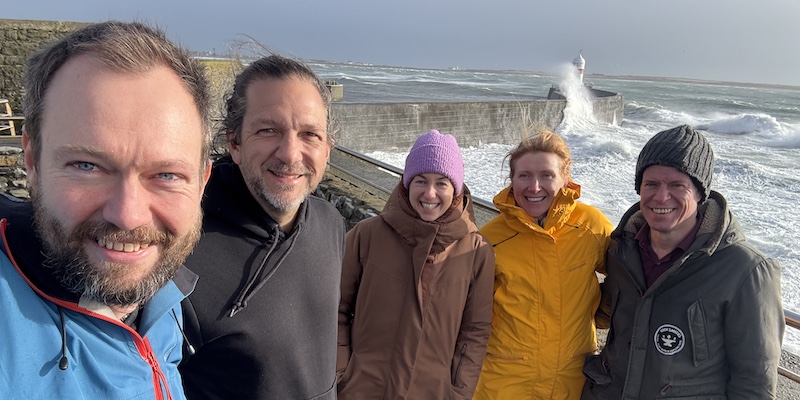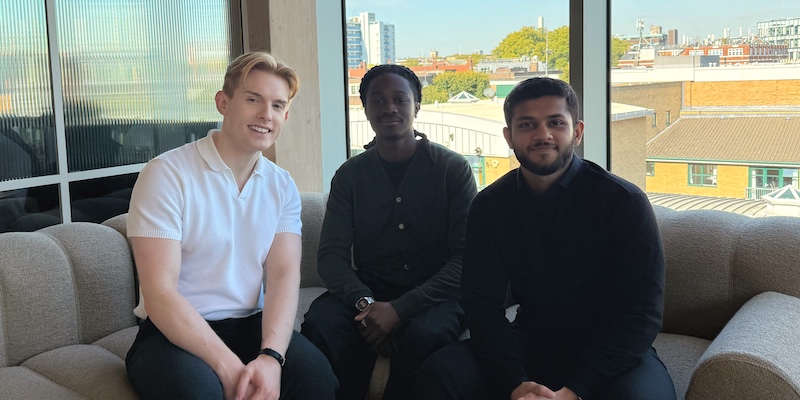
10 Questions with Aparito
Welcome to the first edition of our new blog series '10 Questions with…' where we sit down with founders from our portfolio to shed more light on their journeys of founding and running a tech for good venture.
First up is Dr Elin Haf Davies, founder and CEO of Aparito. Although labelled as “rare”, there are more than 6,000 rare diseases that affect 350 million people worldwide. Developing treatment for patients with rare diseases is already challenging, but the burden placed on the NHS in response to the Covid-19 pandemic has exacerbated difficulties, including drug shortages and the backlog of appointments. However, some of these issues have been alleviated by the use of technology. And it has been well documented that the pandemic has resulted in a rapid adoption of digital technology in the NHS.
BGV portfolio company Aparito is revolutionising clinical trials. Their technology platform helps to streamline the drug development process while prioritising the patient experience. They do this by collecting continuous patient-generated data outside of the hospital, reducing the burden on patients, with fewer visits and hospital-based tests and assessments. They are also able to facilitate long-term patient follow-up, with remote and decentralised monitoring.
Aparito are also contributing to a National Drug Trial named ‘HEAL COVID’ which aims to reduce the number of people who die in the months following a stay in hospital with Covid-19, as well as cutting the number of patients being readmitted to hospital with complications as a result of having the virus.
The following conversation has been edited for this blog. You can watch the full interview above.
Where did the idea for Aparito come from?
My background is in children's Nursing at Great Ormond Street Children's Hospital. I looked after children in around 20 different pharmaceutical funded clinical trials across four different therapeutic areas, and got first hand experience of how difficult and challenging it was for children and families to take part in clinical trials, especially when they were living with a life limiting or life threatening illness. I moved away from clinical work to work as a regulator at the European medicine agency, responsible for licensing new medicines coming through. I was part of the paediatrics team. From both a clinical and regulatory point of view, I realised how difficult it was to generate meaningful data that conveyed what was important to patients, but also demonstrated the efficacy and safety of medicines. And so while Aparito is only seven years old, the idea for what I'm trying to achieve is probably more like 18+ years old! It very much stems back to my clinical frustrations of supporting patients through clinical trials.
What do you hope Aparito will change?
I want to change the clinical trial experience for patients. I really want to flip it on its head and enable clinical trials to be taken to patients, rather than bringing patients to clinical trials. Clinical trials should be accessible to everybody, whether you live close to specialist centres, or you live remotely in a country that doesn't have specialist teams. We give you the opportunity, particularly when you're living with life limiting or life threatening illnesses, to benefit from patient centric clinical trial designs.
Who are you hoping your venture will help?
The life science drug development landscape is a bit of a complicated one. Pharmaceutical or biotech companies usually sponsor the costs of clinical trials, and fund the research and development arm. Clinicians recruit and monitor their patients and get really excited about the science and the opportunities stemming from these drugs, so they are really an instrumental part of it. Then the regulators want to be sure that the drugs are safe and efficacious. And of course, then it's the patients that need to be not only able to take the medicine, but also able to take part in the test, the assessment, and most importantly, see some clinically meaningful change for them. In some ways, our solution is designed for all of those players. But if we can address the needs of the patient, first and foremost, in terms of evaluating the right outcome measures in a right way, then the regulators get assurance that they’ve got good data, the clinicians get to see the benefit of supporting their patients more easily through clinical trials, and the pharmaceutical companies then get better recruitment, better retention rates, and faster drugs to market.
Can you talk about the impact of Aparito to date?
Aparito is now seven years old and we have patients in four corners of the world. We've got patients in Japan, South Africa, across North America, Europe and the work really varies. On one level, there’s the ultra rare diseases where we're looking at gene therapy that's administered directly into the brain, and we follow patients for up to five years. Then at the complete opposite end of the spectrum, we more recently have been involved in long COVID studies. We’re aiming to recruit 20,000 patients with long COVID.While my background and motivation was in paediatrics and rare diseases, the platform has applications much further afield as well.
What’s one thing you wish you had known at the beginning of your startup journey?
There are so many things! If I'm honest, naivety was bliss. I didn't set out to be an entrepreneur or to be on the startup journey. I just wanted a legal entity that I could operate, that wasn't required to be part of an academic, pharmaceutical or regulatory institution. I felt they were so big and it would have been difficult to make changes. I often wonder if I'd have known what it entailed, I probably possibly wouldn't have started!There's different chapters, and as you go through the different chapters, you need to become aware of different things. You sort of become a jack of all trades, master of none, because you need to be able to switch from discussing IP legal issues of your contracting, to financial investment, to a staff recruitment, management and performance review. But I think you find a way through, when the need to know that piece comes along.
What has been the hardest lesson you’ve had to learn in running a startup?
There are two. One is that cash is king. It didn’t matter how excited I was about the idea, how much social impact I was trying to achieve, or how well received it was from the patient community. When you don’t have the cash to pay employees or you can’t persuade investors, it’s a really lonely place to be in. Then later on, when the money is rolling in, you realise that money makes money and all of a sudden it's much easier to get money from all sorts of sources. It’s a bit like waiting ages for one bus to come along, and then three came along at once! I was a real civil servant, a nurse, an academic and a regulator. So moving to a commercial industry, and putting a price tag on everything was difficult for me to adjust to.The second one is just building the team, I found it incredibly difficult. A startup is constantly changing, and you're going through different phases of what you need and how you need it. As well as trying to nurture the great individuals that do come through, whilst going 110 miles per hour. It’s similar to playing rugby, you've got the same size pitches when you're playing sevens or fifteens rugby. In a startup, you're covering the same amount of pitch size, but with less than half the team players. Every single player is left a bit exposed, when they're doing really well everybody can see, but when they're really struggling, it's even more visible. And then that creates a lot of tension and frustration. That really knocked me for six, in terms of how difficult it can be.
What three qualities make a successful founder?
Perseverance: You really just need to keep going.
Resilience: You need incredibly thick skin, because it's quite brutal.
Optimism: I think if you're an optimist and forever try to find the positive optimism in something, that helps you not get dragged down by the negativity.
Aside from Apartio, are there any other Tech For Good companies you admire?
I came across one called ‘Me Too’ for supporting young people with mental health, and I was really inspired by it. Of course, I've been following the BGV portfolio founders and seeing the new companies come through. It's always very inspiring to see all the different thoughts and ideas. There are two others I met recently via nesta. There was chocolate made by children or young adults with autism. And that was just brilliant, separate to the tech focus side of things. Then there was also a platform to enable black and minority ethnic groups to have access to investment funds. As a female founder, I can relate to the challenges of not having access to the same level of funding that male founders have. I can only imagine what it must be like for other groups of people that have even less access than I had. Statistically I get 1% of what's available, or what's invested in male investors.
If someone wanted to find out more about clinical trials or about the work you’re doing in revolutionising them, where would you signpost them?
Well, first and foremost, our website. We're also on social media: Twitter, Facebook, Vimeo, LinkedIn, Instagram. There are a lot of other organisations from a paediatrics point of view, for example ‘Connect for Children’ which facilitates clinical trials for children across Europe. From a rare disease point of view, EURORDIS has a lot of information.
What’s next for you and Aparito and how can people help?
We're just approaching our seven year anniversary, as I've mentioned a few times. It has been some turbulent times, but I feel like we're in a really super exciting, positive place. We've got a phenomenal team in place. We've got such exciting studies and contracts coming through that it's exciting to look at the depth and breadth of clinical trials we're now supporting.Part of the next round will be to go for a series A investment, so that we can focus on expanding our US footprint. A lot of our biotech clients are based in the US and we really feel there is a huge opportunity there. We also want to invest more in our video based analytics. We've been doing a lot of standardised home based video assessments, and want to validate some more of the pattern recognition approaches in the next six to 12 months.





